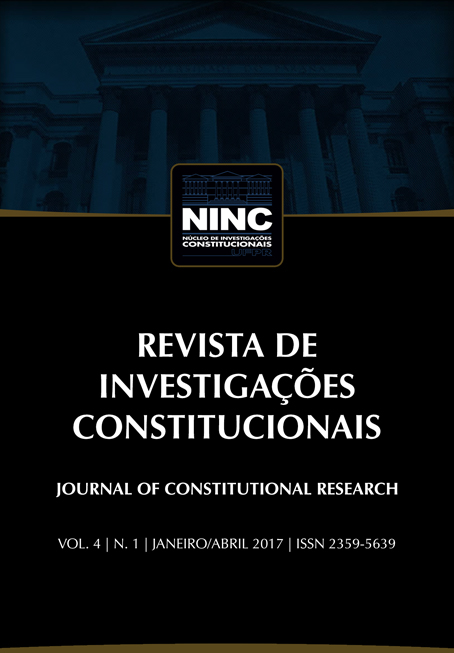Reproductive Healthcare Services and the U.S. Supreme Court: beyond Roe v. Wade and 'Abortion Clinics'
DOI:
https://doi.org/10.5380/rinc.v4i1.47660Palavras-chave:
reproductive healthcare clinics, abortion clinics, first amendment, sidewalk counselors, Roe v. WadeResumo
At a time when the United States is sharply divided on women's reproductive rights, the focus has shifted from legality to that of access to reproductive healthcare services. This debate is too often defined by the pro-choice/anti-choice binary. This binary overlooks women who seek reproductive healthcare services for reasons other than abortion (such as pap smears, gynecological check-ups, birth control, STD testing, breast cancer preventive screenings, etc.). Self-proclaimed sidewalk counselors approach these women to convince them that there are alternatives to abortion. While some women may welcome a sidewalk counselor's approach, the women who choose to ignore them more often than not risk being scolded, yelled at, harassed, and humiliated publicly. These interactions leave many of these women shaken, nervous, and deterred from seeking necessary reproductive healthcare services. Many states have enacted buffer zone legislation to protect women trying to access reproductive healthcare clinics, but an overwhelming amount of these laws have been struck down on a First Amendment basis.
The Supreme Court has decided these cases without defining who qualifies as a sidewalk counselor and who is properly deemed a more threatening protester against whom a legal action may be brought. This has caused great uncertainty in the law. This paper argues that sidewalk counselors and activists’ protesting against abortion outside of these clinics is futile. Reproductive healthcare clinics offer a wide range of services—not just abortions. Therefore, it is impossible for anti-abortion activists to ascertain who is seeking an abortion and who is not without intruding into women’s personal reproductive choices and medical needs. Buffer zones around reproductive healthcare facilities help protect women’s privacy and their right to access so they may obtain the reproductive healthcare they are entitled to receive.
Referências
ALBERT, Richard. Protest, Proportionality, and the Politics of Privacy: Mediating the Tension Between the Right of Access to Abortion Clinics and Free Religious Expression in Canada and the United States. Loyola of Los Angeles International and Comparative Law Review, Los Angeles, vol. 27, n. 1, p. 1-62, jan./apr. 2005.
CHEMERINSKY, Erwin. Appearances can be Deceiving. Green Bag Online, Washington, vol. 17, n. 4, p. 389-404, jun./aug. 2014.
COWAN, Kristen G. The Tailoring of Statutory Bubble Zones: Balancing Free Speech and Patients’ Rights. Journal of Criminal Law & Criminology, Boston, vol. 91, n. 2, p. 385-428, dic./mar. 2000/2001.
EDWARDS, Jamie. McGuire v. Reilly: The First Amendment and Abortion Clinic Buffer Zones in the Wake of Hill v. Colorado. UC Davis Law Review, Davis, vol. 36, n. 3, p. 787-812, feb. 2003.
FINER, Lawrence B.; FROHWIRTH Lori F. et al.. Reasons U.S. Women Have Abortions: Quantitative and Qualitative Perspectives. Perspectives on Sexual and Reproductive Health, [s.l.], vol. 37, n. 3, p.110–118, sep. 2005.
HO, Daniel E.; SCHAUER Frederick. Testing the Marketplace of Ideas. New York University Law Review, New York, vol. 90, n. 4, p. 1160-1228, oct. 2015.
HODGSON, Jane E. Violence Versus Reproductive Health Care: In The United States Organised Medicine Averts Its Gaze. British Medical Journal, London, vol. 310, n. 6979, mar. 1995.
SUTER, Sonia M. The “Repugnance” Lens of Gonzales v. Carhart and Other Theories of Reproductive Rights: Evaluating Advanced Reproductive Technologies. The George Washington Law Review, Washington, vol. 76, n. 6, p. 1514-1598, nov./dic. 2008.
Downloads
Publicado
Como Citar
Edição
Seção
Licença
Autores que publicam nesta revista concordam com os seguintes termos:- Autores mantém os direitos autorais e concedem à revista o direito de primeira publicação, com o trabalho simultaneamente licenciado sob a Creative Commons - Atribuição 4.0 Internacional que permite o compartilhamento do trabalho com reconhecimento da autoria e publicação inicial nesta revista.
- Autores têm autorização para assumir contratos adicionais separadamente, para distribuição não-exclusiva da versão do trabalho publicada nesta revista (ex.: publicar em repositório institucional ou como capítulo de livro), com reconhecimento de autoria e publicação inicial nesta revista.
- Autores têm permissão e são estimulados a publicar e distribuir seu trabalho online (ex.: em repositórios institucionais ou na sua página pessoal) a qualquer ponto antes ou durante o processo editorial, já que isso pode gerar alterações produtivas, bem como aumentar o impacto e a citação do trabalho publicado (Veja O Efeito do Acesso Livre).
























